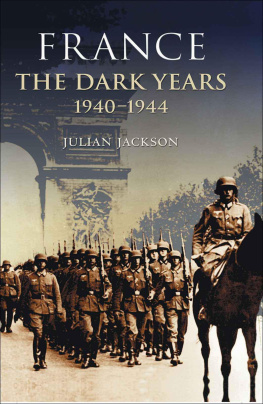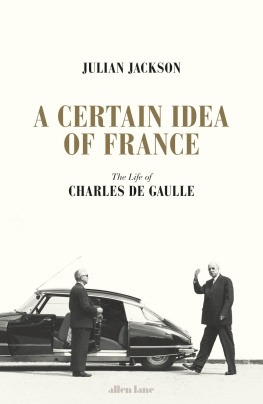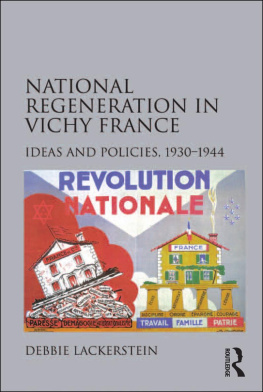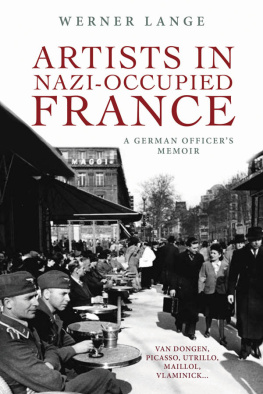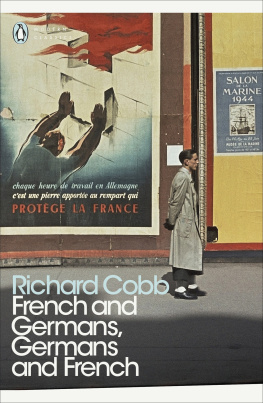France The Dark Years 19401944
France
The Dark Years 19401944
Julian Jackson


Great Clarendon Street, Oxford OX2 6DP
Oxford University Press is a department of the University of Oxford.
It furthers the Universitys objective of excellence in research, scholarship,
and education by publishing worldwide in
Oxford New York
Auckland Bangkok Buenos Aires Cape Town Chennai
Dar es Salaam Delhi Hong Kong Istanbul Karachi Kolkata
Kuala Lumpur Madrid Melbourne Mexico City Mumbai Nairobi
So Paulo Shanghai Taipei Tokyo Toronto
Oxford is a registered trade mark of Oxford University Press
in the UK and certain other countries
Published in the United States
by Oxford University Press Inc., New York
Julian Jackson 2001
The moral rights of the author have been asserted
Database right Oxford University Press (maker)
First published 2001
First published in paperbook 2003
All rights reserved. No part of this publication may be reproduced,
stored in a retrieval system, or transmitted, in any form or by any means,
without the prior permission in writing of Oxford University Press
or as expressly permitted by law, or under terms agreed with the appropriate
reprographics rights organizations. Enquiries concerning reproduction
outside the scope of the above should be sent to the Rights Department,
Oxford University Press, at the address above
You must not circulate this book in any other binding or cover
and you must impose the same condition on any acquirer
British Library Cataloguing in Publication Data
Data available
Library of Congress Cataloging in Publication Data
Data available
ISBN 0-19-820706-9 (hbk)
ISBN 0-19-925457-5 (pbk)
10 9 8 7 6 5 4
Typeset by SNP Best-set Typesetter Ltd., Hong Kong
Printed in Great Britain
on acid-free paper by
Biddles Ltd,
Kings Lynn, Norfolk
To the Memory of My Mother
Preface
This book is inspired by the conviction that the time is ripe for a new history of France during the German Occupation. The last general history of this subject, by the French historian Jean-Pierre Azma, appeared in 1973, but in the twenty-seven years since then a huge amount of research has taken place. My ambition in writing this study is to offer a new interpretative synthesis which takes account of the massive quantity of new work. What this means, therefore, is that this book could not have been written without the pioneering archival work of innumerable other historians. I hope that I have made my debts to them clear in the footnotes, but I would like to take the opportunity in this preface to mention by name some of those historians whose work has been of particular inspiration and stimulation to me: Philippe Burrin, Luc Capdevila, Daniel Cordier, Jean-Louis Crmieux-Brilhac, Laurent Douzou, Jean-Marie Guillon, Stanley Hoffmann, Roderick Kedward, Pierre Laborie, Franois Marcot, Robert Paxton, Denis Peschanski, Henry Rousso, Gisle Sapiro, John Sweets, Olivier Wieviorka.
It can be seen that the majority of names on this list are French, and this fact perhaps needs underlining given the seemingly ineradicable belief outside France (and indeed sometimes in France as well) that the French are still unwilling to face up to their past. While writing this book I lost count of the number of people who wanted to tell me about Frances voluntary amnesia about the Occupation and her predeliction for believing in heroic legends about the Resistance. The problem with such comments is not only the unwarranted condescension which underlies themthe assumption is that we, the British, would have faced up to things much better in similar circumstancesbut also the fact that they are so patently false. It is true that the first important studies of the Vichy regime came from outside France, but French historians caught up long ago. Far from being years which French historians avoid, the Vichy period is probably at present the most intensively researched in French history even if it is difficult to say how far, and in what ways, the findings of the scholarly community have penetrated to the wider public. If anything, however, popular views of the Occupation in France have become excessively fixated on collaboration and anti-semitism while the most recent scholarly research has tended to focus again on the Resistance after some years of neglect. One of my aims in this book is also to bring the Resistance back into the picture while not in any way underplaying the bleaker aspects of the period.
I am most grateful to Tony Morris, formerly of OUP, for having encouraged me to write this book and supporting it so enthusiastically. When I told him that I wanted to write a short book about Vichy, he told me that I should think about writing something more ambitious. I am glad that I followed his advice, but if readers find this book too long, he must share part of the blame. Thanks also to Ruth Parr, Tony Morriss successor at OUP, for continuing to back a project that was not originally her own, to Michael Watson for seeing it through the production process, and to Rowena Anketell for her extraordinarily efficient copy-editing. Much of the research for this book was carried out in the library of the Institut dhistoire du temps prsent, and I am especially grateful for the helpfulness of the librarian Jean Astruc. I would also like to thank the staff of the BDIC library at Nanterre. One beneficial side-effect of the last stages of my research was that I even came to appreciate, if not to love, the new Bibliothque de France: perhaps affection will come with time. I would also like to record my thanks to David Eastwood, my head of Department, who has given my work on this book such support, and has managed in our Department to preserve such a civilized and good humoured working atmosphere even in this unpleasant period of Blairo-Thatcherite permanent revolution in British universities.
I would also like to thank Frank Cherb for his encouragement and for providing me with huge amounts of material about the reporting of the Papon trial in France. Eleanor Breuning was kind enough to help me proof read the entire text: her heroic efforts saved me from numerous solecisms. Three people kindly read the manuscript at earlier stages. Patrick Higgins read quite a lot of an early draft. His careful reading showed me how much more work there was to be done. But my debt to Patrick is much deeper than that. I have learnt so much from him in our twenty years of friendship, and one day I hope I will know half as much history as he does. Roderick Kedward read the whole of the finished manuscript and made numerous helpful suggestions. His encouragement has been very important to me, and the stimulus which his work and inspiration has given to the study of Vichy and the French Resistance in Britain is quite incalculable. Kevin Passmore read the manuscript at too late a stage to be able to make many detailed comments, but I tried to take on board those suggestions which he did permit himself to make. More generally, however, he has taught me a huge amount about inter-war French politics both in his writing and in our many conversations. Having him as a colleague in a university close to my own has been very important.
Finally, and most importantly, I would like to thank Douglas who has lived in closer proximity to this book than he would probably have liked at times. Unfortunately there are few activities that render one more self-centred and selfish than writing a book. I shall try harder to overcome this next time, but in the meantime I can only record my heartfelt gratitude for everything that 1 owe him.
Next page
